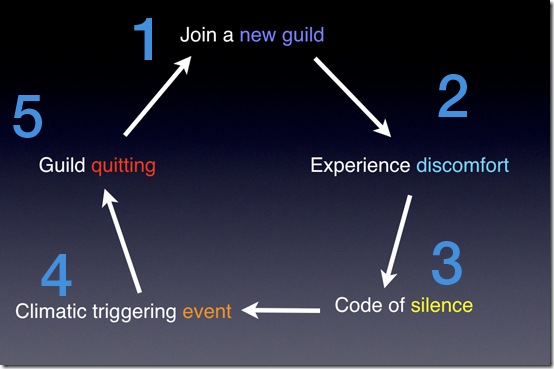
Some of you may remember my article about the 5 Archetypes of Healers back when I was still a guest poster here.
I was watching a conversation on twitter between a few of my friends and it got me thinking. Like every social clique a Guild has certain roles or social archetypes that people can be categorized as. This post series will explore some of the more common ones you may encounter in your travels through MMOs, as well as offer suggestions on how to deal with some of the less savory. These posts come from a request made by Valkrierisen and Firewillow. I’ll add a disclaimer here, this is based on my observations over many years of multiple MMOs and pen and paper tabletop groups.
Today I’d like to talk about one of the bad personalities that people sometimes adopt, the Guild Princess. A Guild Princess is for all intents and purposes a Prima Donna. This role is not gender specific in the sense of the player(both men and women can and do fit this role), but it’s almost always a in game female toon being played. The princess can be a destructive force in a guild, they can undermine authority and leadership, hold raids from starting on time, and can cause guild drama that can become something akin to Jerry Springer.Keep in mind this is an extreme, but it is something I’ve seen many times.
Now there are a few different varieties of a Guild Princess, lets take a look at them shall we?
The Prima Donna
This guild Egoist will usually attach themselves to the vulnerable player base of the guild, usually honing in on the more socially awkward ones first. They can often be found grinding or questing with this person and talking to them late night either in chat messages or even ventrillo/teamspeak. Prime targets are officers or people with power within the structure. Once the person is enthralled enough, they move onto the next person. Sometimes they will find the other females in the guild and begin to cultivate friendships. They will often hide behind “solidarity” and try to build a bond between the players, often times using a sob story or tear jerker to cement it. As with the first point, females in power or who are married to/dating someone in power in the structure is primary target.
This leads to two paths. First the person can and will usually try to use these relationships to get themselves elevated to a position of power, maybe a class lead or lower officer. If they can’t obtain the rank, they will settle for using the friendships they’ve had to get what they want, be it a raid spot, loot or the shunning of a guildie. If someone disagrees with them or doesn’t give up a raid spot or loot the princess wants, they will often times complain or cry to friends about how unfair they were and thus begin a social shunning of the “offender”. This same person will flirt with multiple males in the guild and sometimes throw them at each other when one has outlived their usefulness. They also have a tendency to think of their raid performance as above reproach and when presented with numbers indicating the level of improvement needed or that they are causing wipes, will often have a million excuses that are not their fault. They will often have long periods of being absent, especially during new encounters, but will still expect full loot rights. Watch for canned responses, vague answers or sometimes even re use of an excuse.
How to Deal With the Prima Donna
This brand of Egoist is in the game for power. They want it, they want to be the center of it. There are a few ways to deal with it. If you notice the behavior above, tell your GM or a trustworthy officer right away your concern. The biggest thing for this one is to be proactive. Point out their behavior early so it gets noticed is key, this puts people on guard and allows officers to intervene if needed. This also helps to guard the rest of the guild from this behavior. Warn your close friends too, point out their interactions with other people as examples. Don’t get sucked into the sob stories that they lay out. The worst thing you can do with this one is to do nothing at all.
The Vapid Vixen
This one is used to getting their way because they are a “female” in game. They use their sexuality to get what they want, be it loot, raid spots or whatever. When they don’t get what they want they are prone to pouting or tantrums. They are pretty much the spoiled brat of the guild. During raids they will often talk over encounter instructions, they often die to void zones, possibly even wipe raids all the while chatting away. They are used to being the center of attention and do everything they can to keep it, be it causing drama, holding up raids, talking with anyone that listens or even spouting random snippets or comments in chat or on vent. Anytime the lime light shifts away from them they try to do something to get it back, negative or positive it doesn’t matter as long as all eyes are on them. They are a disruptive force but often times it’s not intentional, they are just used to everyone dropping everything for them and expect it to continue on no matter where they are.
How to Deal With the Vapid Virago
If this behavior is proving disruptive quite simply, ignore them. They make an offhand comment not pertaining to the conversation? ignore it and continue on. They make a comment in vent or talk over instructions? stop talking. When they ask what’s wrong say nothing and continue on with the instructions. They throw a tantrum? After a short while they tend to learn that acting out gets them no where and they settle down. If they don’t settle down they tend to leave to find another stage to perform on.
The Wolf in Sheep’s Clothing
First of all I’d like to say that I respect any man capable of role playing a female accurately. I myself play a female toon, but I’m not certain I could ever accurately portray that in an RP environment.
With that said, this category is for the guys who play females toons and pretend to be female to get what they want. Their main motivation is usually one of the two aforementioned items (see Prima Donna and Virago above). Either they want power, or they want attention and they are using the pretext of a female toon and supposed female player to get them. Pretending to be female lets them prey on the socially awkward of the guild and fill the role of a Devious Diva or Vapid Vixen. They tend to be very open about sex and sexual conversations and will launch into graphic detail if prompted. They tend to be a bit more flirty, refuse to talk on vent (usually with an excuse of shyness or no mic), and tend to be promiscuous in the guild.
Dealing With the Wolf
The same rules for the Virago and the Prima Donna apply here with an added items. If they are being disruptive and causing issues and you want to get rid of them, catch them in the lie. Get them to talk on vent or make a comment that outs them. Usually they disappear shortly after they are found out to start over again somewhere else. It’s not easy but once it’s done they are 99.99999% likely to leave and be gone for good.
The guild princess can be a very disruptive force in your guild. Identifying them early can save your guild a ton of drama and keep things together. Letting them run rampant can splinter the guild and potentially the friendships that you’ve built up. I’ve seen it happen, and it’s not pretty. Find your guilds “Bad egg shute” and help direct them towards it.
Have you had to deal with a Prima Donna in guild? Have any interesting stories or experiences to share about a Guild Egoist?
Until next time,

Image of Veruca Salt from Willy Wonka courtesy of Paramount Pictures





